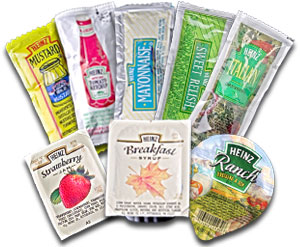As you all know, I’m big into using coupons to build up my food and other emergency preparedness supplies. With the coupon culture comes some unexpected consequences that one may not anticipate. The most obvious consequence is that I buy a lot of the smaller containers as opposed to the large, warehouse size. The good news is that smaller containers are actually a good way to store your food in preparation for an emergency. In an emergency survival situation, smaller is definitely better. Here’s why.
Smaller is Better Reason #1: Cost. We all know that you usually get better value on bigger containers of an item. However, when it comes to using coupons, I’d much rather get 5 free small jars of mayonnaise than pay over $5 for a large one. Most coupons do not come with size restrictions on when you can use them. Some do exclude use on trial/travel size, but not all of the time. And most coupons only require that you buy at least their smallest “regular” sized item in order to use the coupon. So let’s compare for a moment. The other day I got 5 boxes of Post Raisin Bran for 88 cents each in the 20 oz. size. The Raisin Bran cost 04 cents per ounce. Now, at Costco, I could get it for 15 cents per ounce. (Keep in mind there’s a membership involved to get that price as well.) So, perhaps now you can better understand why I believe that I can’t afford to shop at the warehouses in most cases. I reserve my warehouse spending to meats, cheeses, eggs, and perhaps some other specialty items like the tarps I like so much at Costco. At least these items can be canned or otherwise preserved. Even then, I still keep my eyes open with the coupon usage in regular grocery stores. I got a gallon and a half of milk for only 17 cents and 2 pounds of block cheese for $2.99 the other day. Costco and Sam’s Club can’t match that.
Smaller is Better Reason #2: Waste. Obviously in the event of a long-term emergency survival situation, we will be without the luxury of refigeration. This is another reason I’m a big advocate of buying small. When I open a warehouse size of Miracle Whip in the midst of an emergency, I’d better plan on using it all to feed an army or throwing it out due to spoilage. However, when I open a small 15 oz. jar of Miracle Whip, it’s probably just the right amount for a pasta salad or white sauce. I am also a big advocate of saving small condiment packets you are given at the fast food restaruants. I’ve got a lot of salt, ketchup, mayonnaise, mustard, relish, and other items this way, so when I want ketchup for a sandiwch, I don’t have to open an entire jar. I can just open a couple of condiment packages instead. No wasting. No refrigeration necessary.
Smaller is Better Reason #3: Trade. Just as I advised my clients to only keep small bills of U.S. currency on hand for an emergency, the same goes for food items as well. It’s a heck of a lot easier to trade a small can of tuna for what you may need rather than trying to get the best bang for your buck with a large warehouse size of it. In a time of emergency in which food, water, and ammo is king, you may have a hard time “finding a market” for trading your larger items for something that you really need, and thus you’re likely to “under trade” for it.
Smaller is Better Reason #4: Portability. I’d much rather stuff a small can of Vienna Sausages and a couple packages of ketchup in my travel pack than a big 24 oz. container of chicken and a large bottle of ranch dressing, wouldn’t you? In an emergency, even if you have to leave your home temporarily during the day, you shouldn’t do it without some food and water supplies on you. You may be able to assist someone you find along the way, or you may get held up somewhere as well. Regardless, it’s obvious that the smaller containers will travel better than the large ones.
Smaller is Better Reason #5: Storage. It’s easier for me to safely store a lot of little items in containers and place on the shelf rather than large items. For example, when I find a great sale on plastic bins, I’ll take them home and stuff them with toothpaste, or mustard bottles or baby wipes. I’m able to get a heck of a lot more in that enclosed container than I would be able to stack on the shelf or slide under the bed and have them remain there–organized. Given that we’re all struggling to find room for everything, the easier storage component of the smaller items shouldn’t be underestimated.
Dollar for dollar, I’ve discovered that the smaller items make more sense for an emergency. Smaller definitely is better in an emergency.
To see our upcoming event schedule, click here
Check out our inhome-course programs
Subscribe to Preparedness Pro today and never miss a thing!
For any questions or comments on this article, please leave a comment on the blog site so that everyone can benefit!
Copyright Protected 2009, Preparedness Pro and Kellene. All Rights Reserved. No portion of any content on this site may be duplicated, transferred, copied, or published without written permission from the author. However, you are welcome to provide a link to the content on your site or in your written works.






28 Comments
lotsofopinions · August 5, 2009 at 9:02 pm
Hi, Thanks for sharing! Some of these things I had never thought of before.
lotsofopinions · August 5, 2009 at 9:02 pm
Hi, Thanks for sharing! Some of these things I had never thought of before.
Meg from FruWiki · August 5, 2009 at 9:03 pm
FYI, a lot of kitty litter comes in plastic bins that are perfect for storing a lot of things. My husband and I have a few around the house we use. One is our indoor compost bin to hold stuff destined for our outdoor compost pile.
Nowadays I actually prefer pine litter, which I haven’t seen in those containers, but whatever litter you use or don’t use there’s likely to be some cat owner you know who wouldn’t mind giving you their kitty litter bins.
Meg from FruWiki · August 5, 2009 at 9:03 pm
FYI, a lot of kitty litter comes in plastic bins that are perfect for storing a lot of things. My husband and I have a few around the house we use. One is our indoor compost bin to hold stuff destined for our outdoor compost pile.
Nowadays I actually prefer pine litter, which I haven’t seen in those containers, but whatever litter you use or don’t use there’s likely to be some cat owner you know who wouldn’t mind giving you their kitty litter bins.
Alexus Gregory · August 5, 2009 at 10:00 pm
One should not be scared of coupons involved. I hope to be able to share some of some unexpected consequences with you.
Alexus Gregory · August 5, 2009 at 10:00 pm
One should not be scared of coupons involved. I hope to be able to share some of some unexpected consequences with you.
B · August 6, 2009 at 2:57 am
Keep an eye out for condiments in small packages at hospital cafeterias. I am a nursing student so I eat there from time to time and have noticed that they have a lot more than just ketchup and mustard. One hospital I was at had vinegar, honey, lemon juice, soy sauce, etc etc.
B · August 6, 2009 at 2:57 am
Keep an eye out for condiments in small packages at hospital cafeterias. I am a nursing student so I eat there from time to time and have noticed that they have a lot more than just ketchup and mustard. One hospital I was at had vinegar, honey, lemon juice, soy sauce, etc etc.
Michael · August 6, 2009 at 4:31 am
We have also used the small condiment packs in our 72 hour kits with the flat tuna and chicken packs, crackers, etc for emergency food.
Michael · August 6, 2009 at 4:31 am
We have also used the small condiment packs in our 72 hour kits with the flat tuna and chicken packs, crackers, etc for emergency food.
Chris · August 6, 2009 at 2:48 pm
What is the shelf life of the condiment packets? I’ve heard as little as 30 days, to as long as 10 years, but I haven’t been able to find a definiative answer.
Chris · August 6, 2009 at 2:48 pm
What is the shelf life of the condiment packets? I’ve heard as little as 30 days, to as long as 10 years, but I haven’t been able to find a definiative answer.
Kellene · August 6, 2009 at 3:38 pm
I’ve had some for 10 years that I just got into last week. It all depends on how well you store them. cool and dark. cool and dark.
Kellene · August 6, 2009 at 3:38 pm
I’ve had some for 10 years that I just got into last week. It all depends on how well you store them. cool and dark. cool and dark.
stacy · August 7, 2009 at 1:22 am
Where do you get your square food grade buckets?
stacy · August 7, 2009 at 1:22 am
Where do you get your square food grade buckets?
Kellene · August 7, 2009 at 2:54 pm
Stacy, you can get square 4-gallon buckets for free from bakeries and restaurants or you can go to http://www.thebucketguy.com. Tell them that you heard of them through Preparedness Pro for a discount below what they advertise on their site.
We discuss the 4-gallon buckets and how they’re great for making the most of your storage space in this blog: http://bit.ly/NIHcq
Kellene · August 7, 2009 at 2:54 pm
Stacy, you can get square 4-gallon buckets for free from bakeries and restaurants or you can go to http://www.thebucketguy.com. Tell them that you heard of them through Preparedness Pro for a discount below what they advertise on their site.
We discuss the 4-gallon buckets and how they’re great for making the most of your storage space in this blog: http://bit.ly/NIHcq
Larry Moore · August 7, 2009 at 4:17 pm
Get a good book like “Emergency Preparedness the Right Way” by Howard Godfrey. This book covers food storage, water storage, water purification, bug out bags, emergency cooking excetra. One book will not cover everything, but this is a good starting point. It has a good list of referance materials at the end
Larry Moore · August 7, 2009 at 4:17 pm
Get a good book like “Emergency Preparedness the Right Way” by Howard Godfrey. This book covers food storage, water storage, water purification, bug out bags, emergency cooking excetra. One book will not cover everything, but this is a good starting point. It has a good list of referance materials at the end
A Texan · September 8, 2009 at 10:59 pm
I’m going to try to get the 4-gallon square buckets from local sources, and from the bucket guy otherwise, but I was wondering…
What about the 5-gallon orange buckets at Home Depot? Not the most efficient user of space, to be sure, but a good way to start out quickly for only about $2.35/bucket plus about $1 for a lid. They are HDPE, and I wouldn’t store ANY food in a plastic bucket without an inner mylar bag. What are your thoughts?
A Texan · September 8, 2009 at 10:59 pm
I’m going to try to get the 4-gallon square buckets from local sources, and from the bucket guy otherwise, but I was wondering…
What about the 5-gallon orange buckets at Home Depot? Not the most efficient user of space, to be sure, but a good way to start out quickly for only about $2.35/bucket plus about $1 for a lid. They are HDPE, and I wouldn’t store ANY food in a plastic bucket without an inner mylar bag. What are your thoughts?
Kellene · September 9, 2009 at 3:31 am
You can easily get buckets for FREE just by asking your local stores (particularly the bakeries) for them. Also fruit farms have the square ones frequently.
I store food in my buckets without the mylar bags. But I wash them out with a warm bleach water. It depends on what was in them originally though. If it was an oil based item, then I wouldn’t store foods in them.
Kellene · September 9, 2009 at 3:31 am
You can easily get buckets for FREE just by asking your local stores (particularly the bakeries) for them. Also fruit farms have the square ones frequently.
I store food in my buckets without the mylar bags. But I wash them out with a warm bleach water. It depends on what was in them originally though. If it was an oil based item, then I wouldn’t store foods in them.
Comments are closed.